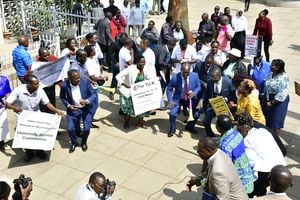
Deputy President William Ruto addressing delegates at Kasarani Stadium in Nairobi on March 15, 2022 during the UDA National Delegates’ Conference.
| Jeff Angote | Nation Media GroupPolitics
Premium
Ruto’s journey to front-runner status in presidential race
Since his debut in politics as a Kanu youth winger 30 years ago, William Samoei Ruto has formally set off on his maiden presidential run, where he is projected as the frontrunner in the race to succeed President Uhuru Kenyatta.
The Deputy President was TUesday endorsed as the presidential aspirant of the United Democratic Alliance (UDA), a party he has popularised for a year since his falling-out with the ruling Jubilee Party. This is the sixth political outfit of which the DP has been a member of the top brass in his three-decade-old political career.
As he accepted the delegates’ endorsement, Dr Ruto, 55, must have marvelled at the long treacherous road he had travelled on his way to the top from the time he joined politics at only 26 and was appointed secretary of the Youth for Kanu (YK ’92), a youth wing established to popularise the ruling party among young voters in the run-up to the 1992 multi-party politics.
The venue of his coronation, the Kasarani Gymnasium, which was painted with a mosaic of yellow with a dash of green and black, was somewhat nostalgic too for the son of Daniel Cheruiyot and Sarah Cheruiyot, who has never shied from punching above his political and economic weight.
Eldoret North MP
Ruto knocked on the door to power politics when, in 1997, he trounced Kanu stalwart Reuben Chesire to become the Eldoret North MP, a feat that paved the way for his appointment as an assistant minister and later a Cabinet minister.
Kasarani Gymnasium was the place where Ruto’s first presidential aspirations were dashed in 2007 during an ODM delegates meeting in which he came third after Mr Raila Odinga, now his main challenger in the August 9 presidential election, and Mr Musalia Mudavadi, now his co-principal in the Kenya Kwanza Alliance.
Yet ironically, the ODM ceremony in 2007 would catalyse huge political developments where Ruto would play a starring role. The event became a springboard for odd realignments that would culminate in yesterday’s UDA national delegates’ convention, which hand the DP the opportunity to hoist himself to the pinnacle of Kenya’s powerbase.
On the path to his first presidential run, as is common in Kenyan politics, Ruto has weathered- and participated in- the backstabbing, treachery, deal-cutting, as well as highs and lows such as his International Criminal Court (ICC) trial for his alleged role in the violence that followed the disputed 2007 presidential election.
Near-civil war
The trials at the ICC in The Hague arose from the near-civil war that engulfed the country following the controversial re-election of President Kibaki that his main challenger, Mr Odinga, rejected as he too claimed victory.
In the subsequent mediation talks, Ruto was among the three negotiators on Mr Odinga’s side.
The talks culminated in the February 2008 peace deal that saw Mr Odinga named Prime Minister in the Grand Coalition Government.
The representation at the mediation talks brokered by former UN Secretary General Koffi Annan lived true to the maxim that the more things change, at least in Kenyan politics, the more they remain the same.
Mr James Orengo and Dr Sally Kosgey, both of whom are rooting for Mr Odinga, now the Azimio flagbearer, and Mr Mudavadi were also part of the ODM negotiating team.
President Kibaki’s PNU was represented by Ms Martha Karua, Mr Moses Wetang’ula, who is also in the Kenya Kwanza Alliance, Prof Sam Ongeri, who is supporting Mr Odinga, and Mutula Kilonzo, who died in 2013.
Mutula was named in the team as ODM-Kenya had backed President Kibaki after the election, which saw its party leader Kalonzo Musyoka named vice-president.
Uhuru Kenyatta
Then Kanu chairman Uhuru Kenyatta, who had as opposition leader taken the unprecedented decision to back the incumbent in the 2007 elections, was subsequently named one of the two deputy prime ministers, the other being Mr Mudavadi.
The appointment of Uhuru is reported to have been the genesis of the falling-out between President Kibaki and his minister Martha Karua, who felt she had done much for his re-election and deserved the deputy premier’s post. Ms Karua later quit Kibaki’s Cabinet.
For his role in Mr Odinga’s 2007 election campaigns, Ruto was named Agriculture minister in the Grand Coalition Government, but the two would later part ways, with the Prime Minister attempting to sack Ruto in 2010.
President Kibaki intervened to save Ruto, who the previous year had survived a motion to censure him in Parliament, which had been moved by then Ikolomani MP Boni Khalwale, who is now one of Ruto’s vocal backers in Western.
The ICC indictment in 2010 of six prominent Kenyans among them Ruto, Uhuru, Francis Muthaura (Head of Public Service), Henry Kosgey (minister), Mohamed Ali (police commissioner) and radio journalist Joshua Arap Sang’ would be another turning point for Ruto’s political career.
Teamed up with Uhuru
In the run-up to the 2013 elections, Ruto, who had formed his United Republican Party (URP), teamed up with Uhuru, who was leading The National Alliance (TNA) to form a coalition – Jubilee – that swept them to power.
The two were only completing a task that had proved too difficult a decade earlier. In 2002, outgoing President Moi had handpicked Uhuru as his preferred successor but the ‘project’ was crushed by the opposition Narc’s Mwai Kibaki.
In 2017, Uhuru and Ruto, who orchestrated the merger of a dozen parties to form Jubilee Party, once again trounced the Odinga-Kalonzo opposition ticket but the union of the Jubilee duo was beginning to falter.
President Uhuru’s March 2018 truce with Mr Odinga was another defining moment in the country’s politics.
Dr Ruto has sought to brand Mr Odinga, who has since been endorsed by the incumbent, as ‘Uhuru’s project’ and like in his early days in politics in 1992, when he wooed the youth for Kanu, the Deputy President is galvanising young voters with his Hustler campaign.
2022 election contest
Tuesday, Dr Ruto framed the election contest as that between his transformative agenda and his rival’s push to retain the old order.
And in yet another escalation of his feud with the president, Dr Ruto termed the second term of the Jubilee administration a waste arguing too much time was spent chasing a mirage.
He regretted the persecution of his supporters by the current Jubilee administration that he dismissed as filled with people who believe that they 'own Kenya'.
"Those who remained loyal to our founding vision within Jubilee were shunned, hounded, threatened and then persecuted. This is how we lost four years that would have gifted the brilliant blossoming of a beautiful dream which inspired millions of Kenyans in 2013," he said.






